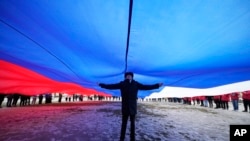Speaking in Moscow on Feb. 10, Russian Foreign Minister Sergey Lavrov highlighted the recent achievements of Russian diplomacy.
Russia has been building a more secure and free world, Lavrov said.
He claimed that Moscow’s diplomatic efforts help eliminate neocolonialism worldwide, along with strategic partners within BRICS (an acronym for member nations Brazil, Russia, India, China and South Africa, along with Egypt, Ethiopia, Indonesia, Iran and the United Arab Emirates) and SCO (the Shanghai Cooperation Organization).
“These associations [BRICS and SCO] include our natural allies and partners, whom we partnered with to eradicate modern practices of neocolonialism.”
That is misleading.
Lavrov’s statement on neocolonialism is an attempt to “camouflage” Moscow’s own colonial policies, Janusz Bugajski, senior fellow at The Jamestown Foundation in Washington, D.C., told VOA News.
Bugajski is a world-renowned author who writes extensively on Russia and Europe.
“Russia remains the most predatory neocolonial power that strips its colonies of resources and people to feed its imperial conquests,” Bugajski said.
Russia’s policy toward former Soviet republics exemplifies neocolonialism as defined by Oxford’s Dictionary of Critical Theory.
From Ukraine, Belarus, Moldova and Georgia to the Baltic nations and the Central Asian states, Moscow maintains control through economic dependence, political and cultural influence and military pressure — mirroring colonial-era governance structures.
Russian President Vladimir Putin has asserted that "Ukraine didn't exist as a separate state and had never been a nation." Putin and his top government official systematically claim ethnic Russians’ “supremacy” over ethnic Ukrainians.
Yale University historian Timothy Snyder states, “When Vladimir Putin denies the reality of the Ukrainian state, he is speaking the familiar language of empire.” Such “claim that a nation does not exist is the rhetorical preparation for destroying it,” Snyder wrote for The New Yorker after the Russian invasion of Ukraine in 2022.
In Belarus, Moscow effectively controls the presidency, turning the nation into a Russian satellite state, scholars at the Carnegie Endowment for International Peace wrote, describing Russian policies as “neo-imperialism.”
The Kremlin “seeks to de facto annex Belarus” to create “a Russian-dominated federated government,” the Institute for the Study of War said.
Russia exerts influence over Moldova and Georgia by fostering “separatist enclaves” such as Transnistria, Abkhazia and South Ossetia, using them as leverage against their sovereignty. Moscow also employs political corruption and aggressive social engineering campaigns to destabilize these nations.
In the Baltic states of Lithuania, Latvia and Estonia, Russia wages disinformation attacks, hacking operations and large-scale social engineering campaigns to undermine democracy.
A Lithuanian security report in March 2024 highlighted Russian campaigns to destabilize the Baltic states, weaken public trust and disrupt government institutions.
In Syria, Russia supported Bashar al-Assad’s regime, thus transforming the country into its strategic military and intelligence hub and a neocolonial outpost.
Russian naval and air military bases in Syria enabled Moscow to expand arms trade and project power across the Middle East.
In Africa, Russia seeks to expand its influence and secure access to valuable resources such as gold, rare earth minerals and diamonds. Moscow has established a military presence and has been supplying arms to warring sides in multiple conflicts, preying on instability.
In the Arctic, Russia seeks to dominate the region and control its natural resources via militarization and claims over disputed territories. Experts describe Russia’s behavior in the Arctic as neocolonial and aimed at asserting its power over strategic land.
As for Lavrov’s reference to Moscow’s “natural partners” and their joint fight against neocolonialism — that claim is also misleading.
BRICS formally opposes neocolonialism and aims to counter Western financial dominance. It promotes multipolarity, trade in local currencies and reducing reliance on the U.S. dollar.
BRICS has been dominated by China, which accounts for 70% of the bloc's GDP.
China’s debt-driven investments in underdeveloped countries in Africa and Asia exploit resources, increase dependency through debt trap, and weaken indigenous cultures. There is a consensus among China analysts that such policies are of neocolonial nature.
China’s pursuit of Taiwan, a functionally independent democracy, “depends on the erasure of a (proto-) national Taiwanese identity, and possibly the suppression of the people who claim it,” Catherine Lila Chou, a modern history scholar, wrote for Cambridge University’s The Historical Journal in July 2024. Chou and other scholars defined China’s policy on Taiwan as neocolonial.
Another multinational group that Lavrov mentioned — the Shanghai Cooperation Organization — is a security alliance led by China and Russia that includes four Central Asian countries. Its prime agenda is to force the West out of Central Asia and replace it with Chinese and Russian powers. To assert control, Beijing and Moscow use SCO to back authoritarian regimes and give them an international platform to legitimize domestic repression.






